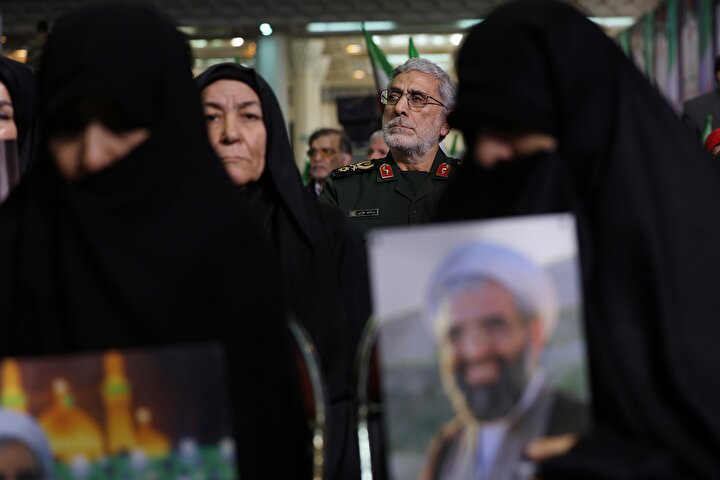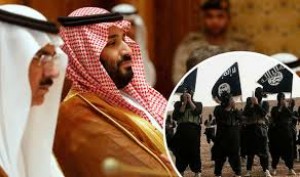
Saudi Arabia, West’s biggest stronghold in Arab ME

Thanks to their petrodollars, the House of Saudi pursues a
conservative intervention at every nook and cranny in the Middle East
whenever a liberal movement arises.
The book "Lebanon’s Hezbollah and the Islamic Awakening” published by the Islamic Revolution Documents Center reads:
Dr. Said Al-Shahabi believes during the Arab spring era, oil despots and their Western allies play antithesis to the revolutions of Arab nations. Besides oil rulers, Salafi extremists are pioneers in the war between Islamic sects. Using their sharia rules, they ignited a war against the Shia community and also adopted sectarian clash as their key role. He explicitly said that the leadership of anti-revolutionary movements was in the hands of Saudi Arabia, carried out with full support from the US and UK. They are not far to imagine to use suicide operations to discourage the public revolutions.
What Saudi Arabia carried out against the Hezbollah during the 33 day war was another aspect of the despotic, West driven approach of the House of Saud against the Islamic awakening in the region. In an official statement on July 13, 2006, Saudi Arabia stated support for the legal resistance in Palestine and Lebanon, but said it was cynical about headstrong, non-coordinated movements with the Lebanese officials, since they created dangerous situations for all Arab countries. The House of Saud believes that these adventurers, that is, the Lebanese Hezbollah, should have adopted the responsibility of their behavior and pay for it. This official stance meant a green light to the US and Israel to completely demolish Hezbollah. These rulers who some day used to pay from their own pocket and tongue for the resistance, are now facing away from it and segregating resistance into "legal” and "adventurist” to place the movement in a political and military bottleneck. Saudi Arabia’s policy toward the 33 day war in Lebanon is justified by its parallel lines with US policies as well as a fear of Iran’s permeation in the region, especially among Arabs.
Neostrategist Farid Zakaria, an Indian- American, considers Saudi Arabia as a country without extended change which reins Arabs both inside and outside the country thanks to the petro dollars in order to prevent revolutionary changes in the country as well as across the Arab world. Of course he believes that change in non-oil Middle East countries such as Egypt and Tunisia come about easier than in oil countries with dictators, which is the case with Yemen. But of course it has to be asked of Zakaria why Libya and Bahrain are seeing revolutions although they are oil countries. And also why Saudi Arabia and the US oppress them and preclude basic changes in their systems.
What is witnessed in the regional policies of Saudi Arabia in countries such as Bahrain, Iraq, Syria, and Lebanon, or its intervention in Afghanistan, Pakistan, and Yemen indicates a kind of sway by the West and Israel.
Although there is no powerful social or political movement to topple the Saudi regime, the country’s Shias showing response only to the Hezbollah’s success against Israel or taking position against Saudi’s military presence in Bahrain, the Saudi regime is carrying out some harsh cases of oppression in Shia areas.
The House of Saudi during the 33 day war carried out necessary arrangements with Lebanon, Turkey, Jordan, Egypt and other countries to keep silent in the initial days in order to strike a hard blow to Hezbollah. Currently, Bandar bin Sultan, along with Jeffry Feltman, former US ambassador to Lebanon, as well as Israeli agents in Homs, Dara, Lazeghia, and other places in Syria are trying to pressurize Assad. They are aiming at overthrowing Assad and creating a power balance in the current developments that favors the West and Israel.
The Hezbollah has announced that lack of stability in Syria will mean lack of stability in Lebanon, which would not be acceptable for the Hezbollah. Bin Sultan once officially called upon the Israeli prime minister to attack the Hezbollah, stating even that he would fund the whole attack.
This is while Saudi clerics were the only clerics across the Islamic world that filed against Hezbollah. Sheikh Abdollah bin Jabrain, a Saudi cleric said helping the Hezbollah was not allowed and whoever helped them would be like them criminal.
Qazi Hossein, leader of the Pakistani Islamic Community, in an interview said the victory of the Hezbollah was a huge change in the Islamic world which would restore the pride and self esteem of Muslims and Arabs. He said reach change comes with nations and that so far as governments are not the real representatives of the nations, the paper tiger of Israel would be fearsome to them. Qazi Hossein then asked the leaders of Islamic movements around the world lead their nations into fundamental changes, since the present movements of the leaders and governments were parallel to the interests of the US, and thus they could not bring any real change to the scene. Arab nations are against US sway and their opposition is growing on a daily basis. Those rulers and governments which are opposed to the people in this regard, such as the Saudi rulers and their Western allies, are not to be trusted and have to hand over the rule to the real owners of the Islamic movements. He called Hassan Nasrallah the real representative of the nation, someone who calls Israel a making of colonial powers in the Middle East. If nations in these societies adopt the real role, this military garrison (Israel) will be eliminated from the circle of Arab countries.
Despite Saudi Arabia’s insistence on leading Arab revolutions and their opposition to a jihadi approach to fight against the US and Israel, regional nations are trading along the path to Islamic awakening. Although as the real supporter of popular and Islamic movements, the Islamic Republic of Iran has made no interference with the popular movements in the Arab spring, Arab rulers, for their fear of the Islamic revolution, keep accusing Iran of intervention.



